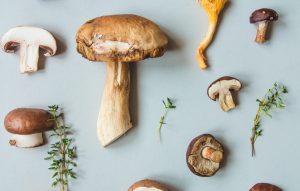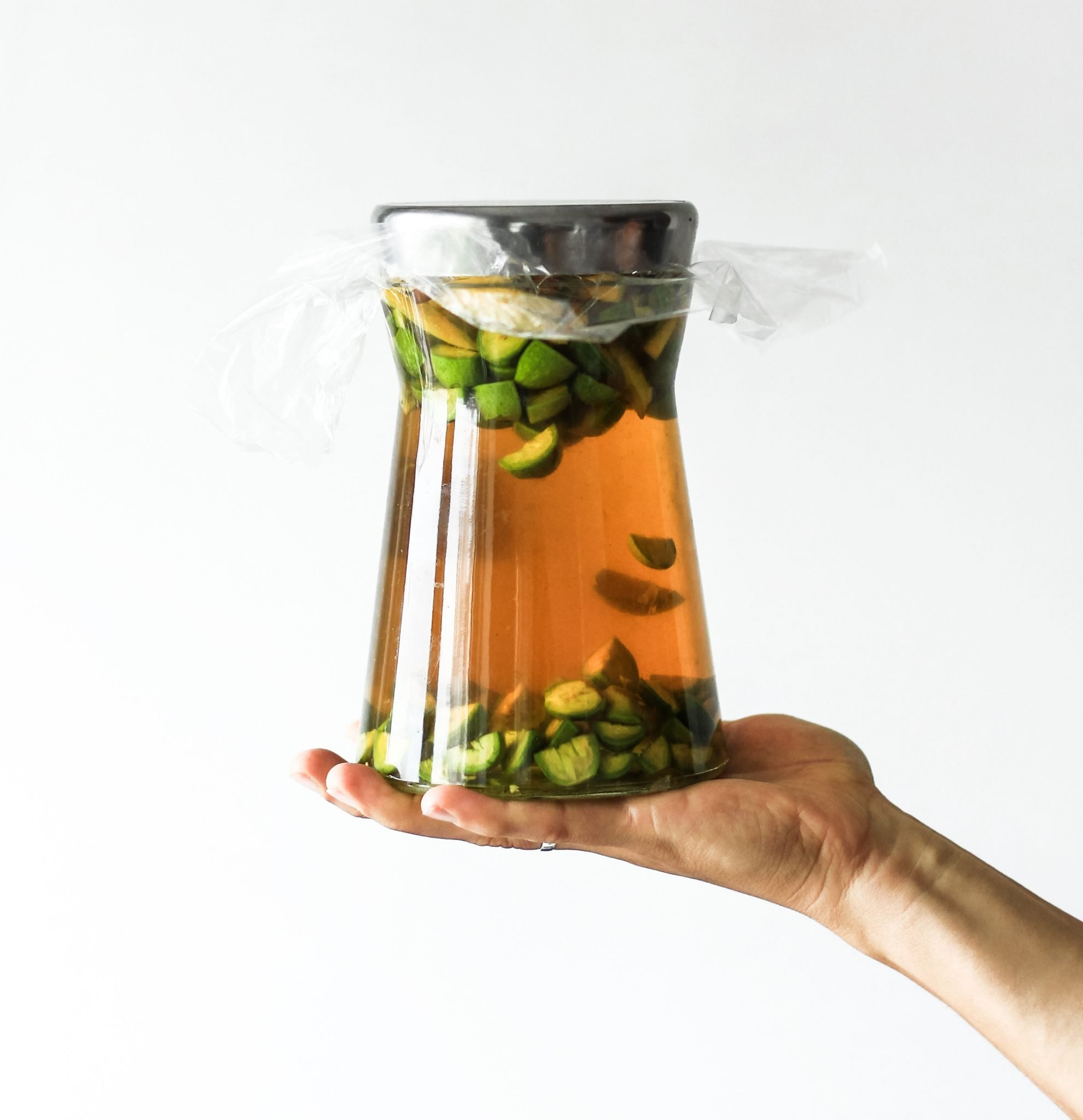Today, I’m bringing you a quick hit of the gut health and immunity-building tips that I’m personally using to stay as healthy as possible in these crazy times. There is a lot of fear surrounding the current pandemic, and while most things about this situation are out of your control you do still have the power over your own personal health routines. To be clear, I’m not claiming that any of these strategies will prevent you from getting sick, but keeping your immune system in top shape is still obviously a good thing when it comes to overall health, immunity and recovery.
Natural ACE2 Receptor Blockers
Current research demonstrates that ACE2 receptors play a critical role in influenza virus-induced lung injury. There is also some evidence that individuals with higher expression of these receptors are at increased risk of contracting the flu. Based on pathophysiology of viruses I’m personally supplementing with herbs and nutrients that act as natural ACE2 receptor blockers this cold & flu season; as a bonus many of the following ACE2-blocking herbs also have a history of use as antivirals and immune stimulants:

Improve Your Gut Health
Another important area to consider when it comes to overall immunity is the gut. That’s because your digestive system is home to the trillions of bacteria that make up your microbiome, and these bacteria play a critical role in maintaining a strong immune system. It’s also the site of Gut-associated lymphoid tissue (GALT) which is an important part of your immune system that helps protect the body from bacteria and viruses.
When your gut lining is damaged — a condition commonly known as ‘leaky gut‘ – your immune system is far less capable of protecting you from pathogens. Gut dysbiosis, or an unfavourable ratio of good to bad bacteria in the digestive system can also make you more vulnerable to getting sick since you’ll have less beneficial bacteria to help you ward off pathogens. I’m currently taking double doses of my favourite immune-supportive probiotic (speak to your ND about which strains are right for you), and loading up my diet with gut-supportive foods and nutrients. Studies show that probiotic supplementation helps to maintain healthy gut flora, rebalance the immune system, reduce inflammation and improve overall digestive function. Probiotic supplementation doesn’t actually ‘recolonize’ the gut, and must therefore be taken consistently to maintain beneficial results.
When it comes to improving your gut health and immunity, we obviously need to consider the foods that you eat. While processed and unhealthy foods can damage the intestinal lining the following foods and natural supplements that can actually repair intestinal damage, improve levels of beneficial bacteria and heal your digestive system:
- Bone Broth: I’m currently drinking a cup of homemade bone broth every single day to maintain a healthy digestive & immune system. Bone broth is a gut health super food because it’s full of amino acids and nutrients which help to speed the turnover and healing of the gut lining. It’s also especially high in the nutrient zinc, which can improve immune surveillance and overall immunity. Bone broth naturally contains collagen, gelatin, and glutamine which all help repair the gut lining and prevent future damage.
- Resistant Starches: These are fibres that are not easily digested in stomach or small intestine. Instead, they remain intact and provide fuel for the healthy bacteria living in your gut. This fuel allows your microbes to produce beneficial compounds called short chain fatty acids (SCFAs). Butyrate is an important SCFA produced in the the intestines, and having increased levels of this fatty acid reduces inflammation, provides antioxidants and even reinforces the defensive barrier in the gut. Eat 1/3 cup daily of any of the following food sources of resistant starches to feed those healthy bacteria living in your intestines: seeds, cashews, unprocessed whole grains, legumes, raw or cooked potatoes, raw green bananas, raw oats, plantain & plantain flour (use in healthy baking or throw 1 tbs into smoothies).
- Gelatin: Gelatin makes up almost a third of all of the protein in our bodies, and a dietary deficiency of this key nutrient can wreak havoc on your gastrointestinal system. Gelatin, which comes from animal bones, was traditionally a key part the human diet since it provides important amino acids for gut health and joint support. Gelatin thickens very quickly as it cools, so it’s best to eat gelatin in gummy form or drink it in your bone broth.
- Kombucha: Kombucha is made by fermenting sweetened tea with a symbiotic colony of bacteria and yeast (aka SCOBY). During the fermentation process the bacteria in the SCOBY breaks down the sugar in the tea to release probiotic bacteria. A recent study analyzed the probiotic content of Kombucha and found it to be rich in 2 strains; Gluconacetobacter and Lactobacillus; the most prevalent beneficial strain found in a healthy human microbiome.
- Glutamine: I often prescribe glutamine supplements to patients with suboptimal immune systems because it acts as an anti-inflammatory in the gut and is also necessary for the repair of the intestinal lining. While probiotics can indirectly aid regeneration of gut lining, L-Glutamine is an incredible supplement because it can directly feed the cells in your gut so they can regrow. Research shows that glutamine is also used by the cells of your immune system to produce the defensive white blood cells that help protect you from viruses.
- Fermented foods: Fermented foods are another great source of naturally occurring probiotics. Probiotic-rich foods help to keep your gut flora balanced by maintaining high levels of ‘good’ bacteria, which creates a favourable environment to begin the gut healing process. My favourite fermented foods are sauerkraut, kimchi, homemade coconut yoghurt and tempeh – and I try to include at least one serving into my diet each day. You can check out my recent Fermenting 101 post where I give you all the best tools and recipes to make fermenting easy, fun and safe for beginners.
- Coconut oil: Coconut oil is abundant in a compound called lauric acid, which makes it a wonderful gut-healing super food. Lauric acid has antimicrobial and antifungal properties to help maintain a balance between good and bad bacteria in the digestive tract. Coconut oil is also a natural anti-inflammatory, which may help heal the intestinal lining and improve symptoms inflammatory bowel disease. I typically recommend that my patients start with a conservative dose of 1 – 2 tsp daily and build up their intake after a few months of working on the gut with the other foods and supplements listed above.
Unfortunately, the worst thing you can feed your microbiome is sugar. Sugary foods suppress the immune system and cases unfavourable changes to the gut microbiome so while you’re loading up on gut-healing foods it’s also wise to eliminate sugar for a few weeks during the change of season (the time when our immune systems are most susceptible to colds & flus).

Essential Nutrients & Foods To Boost Immunity
Now that your gut is covered, these are my top functional foods, supplements and herbs that you can also use to support your immune system this season:
- Vitamin D: My number one recommendation for healthy immunity, especially for those of use living in Canada, is to make sure that your vitamin D levels are optimal. Your body uses vitamin D to support your immune system and decrease your susceptibility to illness. I like my patients to sit above 125 nmol/L for optimal immune health so make sure you’re checking levels frequently. Any dose of vitamin D over 1,000IU is considered a medication and should only be prescribed by an MD, ND or NP in Ontario, so make sure you’re seeking professional guidance when it comes to your ideal dose.
- Sage: Sage tops my list of immune system super stars. Not only is it delicious when combined with almost all fall and winter vegetables, there is also a well-designed study proving it’s value as an immunostimulant. In this study researchers found that immune-suppressed participants showed significant increases in immune-competent white blood cells when they ate diets rich in sage (and oregano, see below!). Eating sage also improved white blood cell differentiation in and maturation into neutrophils; the most common type of white blood cell in your body. Neutrophil differentiation (aka growth) is critical when it comes to preventing viruses since these cells are you main defenders against infections.
- Turmeric: The darling of the wellness space, turmeric has been getting a ton of good press over the past few years. You’ve likely already heard all about the anti-oxidant, anti-inflammatory properties of turmeric, but it’s also an excellent natural anti-viral to help you fight off colds & flus. We’re sipping on turmeric lattes in my house these days, as well as added fresh turmeric to smoothies and stir fries.
- Ginger: Ginger has been used by traditional healers for hundreds of years to support the immune system and is one of most common herbs prescribed to help with immunity. Ginger is a natural antiviral and anti-bacterial so it may directly help your body fight off infections. It’s also a great source of anti-oxidants which indirectly support your immune health.
- Licorice root: Licorice isn’t an herb that most people automatically think of when it comes to preventing viruses, but it has powerful indirect effects on your immune health. In addition to acting as a natural anti-viral, research demonstrates that licorice supplements can rehabilitate cortisol production in stress-out adrenal glads. While we often villainize cortisol as a “stress hormone” it’s key to your immune health since it helps your body amount a healthy immune response. I don’t know about you, but I’ve found this year to be quite stressful and personally need all the help I can get when it comes to my adrenal health / resilience. Licorice root tea is a great addition to your natural immune boosting kitchen pantry or you can speak with your naturopathic doctor about a customized adrenal-supportive supplement if you feel like stress may contributing to your immune issues.
- Green tea: While both green and black teas are rich in flavonoids (a type of immune protective antioxidant) green is my pick for a potent immune system because it contains higher levels of epigallocatechin gallate / EGCG. EGCG has been shown in multiple studies to enhance immune function so I often encourage my patients to drink 2 – 3 cups daily through the change of season.
- Garlic: Garlic contains natural compounds that have been shown to improve your body’s ability to fight off viruses by up-regulating the function of your white blood cells. Studies prove that high doses of garlic can reduced the likelihood of getting sick by 63%. Already feeling unwell? Another study determined that garlic can reduce the duration of an illness by 61%.
- Mushrooms: Medicinal mushrooms are this doctor’s favourite immunity secret weapon. Most mushrooms are rich in polysaccharides called beta-glucans. These sugars, found in the cell wall of mushrooms, have been shown to increase your Th1 immune system activity; the part of your immune system responsible for defending your body from viruses (especially Reishi, which also has ACE2-blocking properties). They can also stimulate immune cells called macrophages, cytokines and natural killer cells to improve you body’s anti-body response and increase your natural immune surveillance.

Vitamin C
Vitamin C gets it’s own category when it comes to colds & flus since it may help to reduce hospital time for patients with flu viruses. Vitamin C is also particularly helpful in boosting the immune system of people experiencing stress (so, all of us right now) because this vitamin is stored in the adrenal glands and can contribute to overall adrenal health. Vitamin C is a cheap and safe addition to your medicine cabinet because it acutely supports the immune system during flu season. As with any supplement, check with your Naturopathic doctor first, but studies show that between 500-1000 milligrams every 2 hours is effective at shortening the duration of upper respiratory tract infections. I also recommend adding more of the following Vitamin C rich foods to your diet this time of year:
- Orange + grapefruit
- Tomatoes
- Kiwis
- Red bell peppers
- Broccoli
- Strawberries
- Lemons
Wishing you all a safe & healthy change of season. xo
References
Looking to connect with a Naturopath in Oakville to discuss your immune health goals and guidance through a personalized immune-supportive protocol? Book your appointment here.
This information is not intended as a substitute for the advice provided by your Naturopathic doctor or primary care physician. Do not use the information in this document for diagnosing or treating a health problem or disease. Always speak with your Naturopathic doctor before taking any medication or nutritional or herbal or using any treatment for a health problem. If you have or suspect that you have a medical problem, contact your health care provider promptly. Do not disregard professional medical advice or delay in seeking professional advice because of something you have read online.




